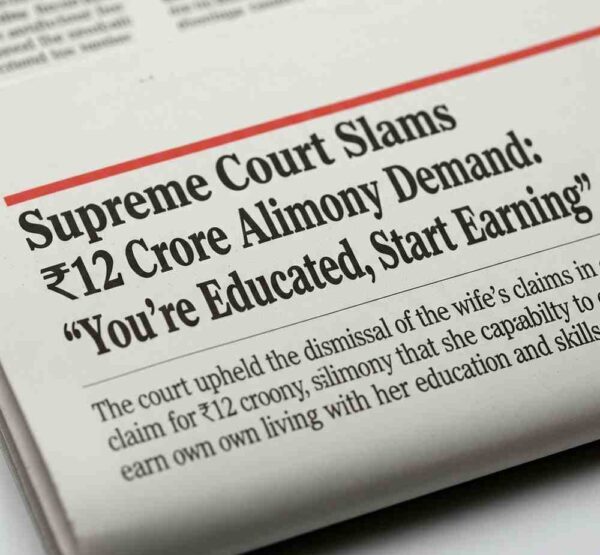The Supreme Court questioned a woman’s demand of ₹12 crore alimony, a BMW, and a Mumbai flat after a short 18-month marriage. The CJI urged self-reliance and said highly educated women should work instead of relying on alimony. Read the full case update.
Introduction
In a recent matrimonial case, the Supreme Court of India firmly addressed an excessive alimony demand made by a woman married for only 18 months. She sought ₹12 crore, a BMW, and a luxury apartment in Mumbai as part of her settlement. The bench, led by Chief Justice of India D.Y. Chandrachud, strongly criticized the inflated claim and underscored the importance of self-reliance for educated women, rather than financial dependence.
What Was the Case About?
The case came before the Supreme Court after the Bombay High Court refused to provide relief to a man whose wife had withdrawn from a mutual divorce settlement. The woman, an MBA graduate and an IT professional, had initially agreed to accept a flat in Mumbai’s Kalpataru Habitat as a full and final settlement. However, she later backed out, seeking a more lucrative deal.
Her new demands included:
- ₹12 crore in alimony
- ₹1 crore per month as ongoing maintenance
- A luxury BMW car
- Continued ownership of a premium flat in Mumbai
Supreme Court’s Response
During the proceedings, Chief Justice BR Gavai expressed serious reservations about the overly inflated financial demands. Addressing the woman directly, he said:
“You’re highly educated. Instead of asking for such massive support, why don’t you start working and earn your own living?”
He emphasized that alimony is meant to provide reasonable support and not to offer a lavish lifestyle post-divorce.
CJI Gavai further remarked:
“The marriage lasted only 18 months. Now you want a BMW too? ₹1 crore per month? Is this reasonable?”
Husband’s Arguments
The husband’s legal team, led by senior advocate Madhavi Divan, argued that the woman had violated the initial settlement by backing out after the first motion of the mutual consent divorce was approved. Over 20 litigations between the two were supposed to be withdrawn as part of the agreement, but the wife chose to continue fighting for a better deal.
Divan also pointed out:
- The woman already lives in a flat with two parking spaces in Mumbai.
- The BMW she is requesting is a decade old and has been discontinued from production.
- She is qualified to work and support herself financially.
Woman’s Defense
The woman argued that her husband is extremely wealthy, earning over ₹2.5 crore annually, and that she had suffered due to his actions, including losing her job. She claimed that a false FIR was filed against her and that he sought annulment by alleging she had schizophrenia.
At one point, she asked the court:
“Do I look like I have schizophrenia?”
Court’s Observations on Alimony
The Supreme Court made several key points during the hearing:
- Self-Sufficiency for Educated Women: Women with professional qualifications are expected to support themselves.
- Alimony Isn’t a Lifetime Luxury: Divorce settlements should be reasonable and not seen as a source of lifelong financial gain.
- No Claim Over In-Laws’ Property: The woman was reminded that she had no legal rights over her husband’s father’s property.
- Settlements Must Be Respected: Agreements made in good faith should not be broken for the sake of renegotiating a better financial outcome.
Court’s Offer to the Woman
To resolve the matter, the court gave the woman two options:
- Accept a flat in Mumbai, free of financial burdens, or
- Take a ₹4 crore lump sum and restart her career in IT hubs like Pune, Hyderabad, or Bangalore
The bench stated:
“There is a high demand for qualified IT professionals in these cities.” You should explore opportunities instead of depending on your ex-husband’s income.”
Additionally, the court said it would cancel any pending FIRs or criminal complaints if both parties agreed to a peaceful separation.
Legal and Social Significance
This case is not just about a divorce settlement—it highlights broader issues in matrimonial law:
- Misuse of Mutual Consent Divorce: The woman initially agreed to terms and later retracted, which the court viewed as misuse of the process.
- Balance of Rights and Responsibility: While alimony exists to support those in need, it should not be used to exploit one party financially.
- Promoting Economic Independence: The court’s message is clear—education and self-reliance should take priority over financial dependency.
Conclusion
The Supreme Court’s observations in this case reflect a shift toward practical and balanced decisions in matrimonial disputes. By calling out exaggerated alimony demands and urging capable individuals to be self-reliant, the court has set a strong precedent for future cases.
This case sends a powerful message: divorce laws are meant to protect, not to profit. Reasonable claims based on genuine need will be honored, but exploitation of the legal system will not be tolerated.

























